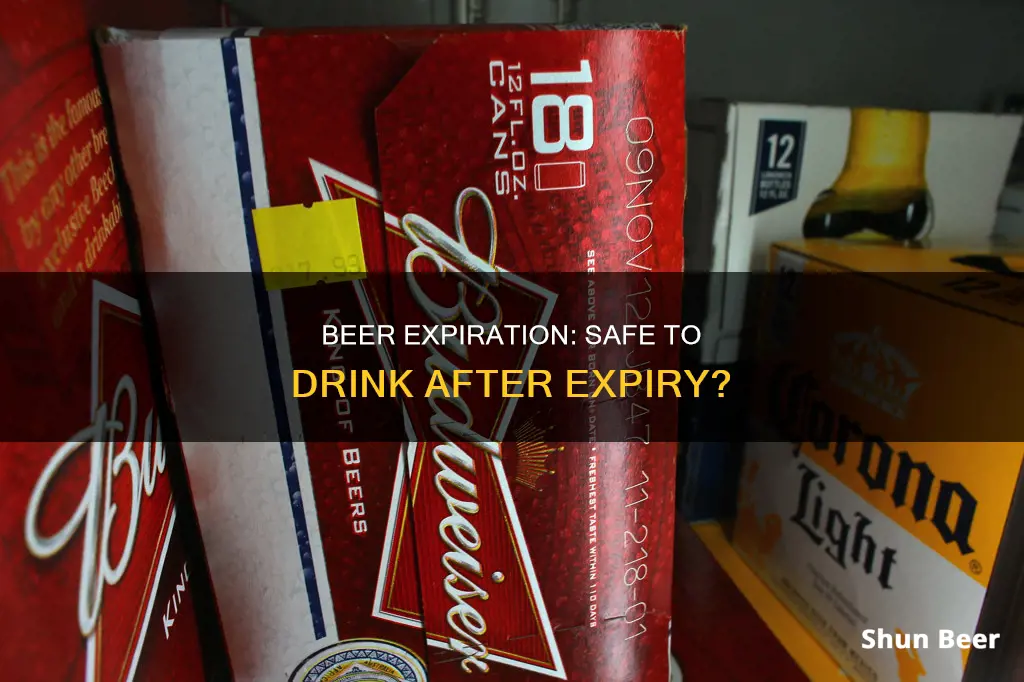
Beer is just like any other food and has a shelf life. It is made from organic plant ingredients that will eventually decay. Beer does expire, but it won't make you sick. The alcohol content in beer acts as a natural preservative, making it difficult for bacteria to survive and thrive. The fermentation process is an excellent way to eliminate pathogens from your drink. However, the flavour and quality of the beer will degrade over time. Beer tends to lose its flavour and other characteristics that make it so enjoyable.
| Characteristics | Values |
|---|---|
| Beer expiry | Beer does expire but it won't make you sick. |
| Expiry date | Beer usually has a "best before" date, which is a guideline for retailers and consumers. |
| Taste | Beer tends to lose flavour and freshness over time. |
| Health | Beer is filtered and pasteurized before bottling or canning, eliminating bacteria. |
| Storage | Beer should be stored in a cool, dark place, away from sunlight and temperature fluctuations. |
| Packaging | Beer in cans is likely to stay fresh for longer than beer in bottles. |
What You'll Learn

Beer expiration is mostly about taste, not safety
Beer does expire, but it is harmless to drink it past its expiration date. It won't make you sick, but it might not taste very good. The only danger is to your taste buds.
Why Beer Doesn't Make You Sick
Pathogens cannot live in beer, so from a health standpoint, it cannot go bad. The fermentation process is an excellent way of eliminating pathogens. That's why, in ancient times, people often drank beer when water sources were unclean.
Why Beer Tastes Bad After It Expires
Beer is made from organic plant ingredients that eventually decay. Brewers work to make beer last as long as possible, but oxygen, time, and temperature changes can affect the taste.
Oxygen can change the beer, sometimes adding a stale "cardboard" flavor. Hop aromas are very time-sensitive, so the citrusy, floral, or tropical hop aromas will disintegrate over time.
Light exposure can also cause a problem. The chemicals in hops react poorly with ultraviolet light, creating an odor similar to a skunk's. That's why many bottled beers come in dark-colored glass.
How to Store Beer
Beer should be stored in a dark, cool place, such as a refrigerator, basement, or cool closet. The hotter and brighter the location, the faster the beer will go bad.
Beer lasts about 5 to 9 months beyond the expiration date listed on the label if stored at room temperature. In a refrigerator, beer can last up to an additional two or three years. Opened beer has a shelf life of about a day.
The Bottom Line
While drinking expired beer is safe, it's not always pleasant. To ensure the best taste, drink beer as close to the packaging date as possible.
Does Helium Beer Work? The Science Behind It
You may want to see also

Beer is best consumed within 6 to 9 months of bottling
Beer has a shelf life and does expire, but it won't make you sick if consumed past its expiration date. The expiration date on beer is more of a "best before" date, after which the beer's flavour and quality will start to degrade. Beer tends to lose flavour and other characteristics that make it enjoyable. The taste becomes stale, flat, or develops off-flavours.
The shelf life of beer varies depending on the type of beer and how it is stored. Most beers are best consumed within 6 to 9 months if stored at room temperature. Refrigeration can extend this period to up to 2 years. Unpasteurised or craft beers may have a shorter shelf life.
To maximise the shelf life of beer, it should be stored in a cool, dark place, away from temperature fluctuations, and upright to minimise oxidation. Exposure to light, oxygen, and bacteria can cause beer to spoil faster.
Additionally, the type of packaging can affect the longevity of beer. Cans are airtight and better protect the beer from oxidation, while glass bottles may have air at the top and are not completely airtight, allowing oxygen to interact with the beer and potentially causing a flat taste.
Endoscopy and Beer: What You Need to Know
You may want to see also

Refrigeration can extend a beer's life by up to 2 or 3 years
Beer is made from organic plant ingredients that will eventually decay. Brewers work hard to make beer last as long as possible, but factors like temperature and oxygen exposure can speed up the process.
One of the best ways to extend the life of beer is through refrigeration. When kept cold, beer can last up to 2 or 3 years beyond its expiration date. This is because cold temperatures slow down the chemical processes that cause beer to spoil.
It's important to note that refrigeration doesn't completely stop the ageing process – it just slows it down. So, even when refrigerated, beer will eventually go past its prime.
To maximise the shelf life of beer, it's best to store it in a cool, dark place, away from direct sunlight and heat sources. Keeping beer upright can also help to minimise oxidation.
Additionally, the type of beer and its packaging can affect its shelf life. For example, canned beer tends to last longer than bottled beer due to better protection from light exposure and oxygen. Darker beers, such as stouts and porters, also tend to have a longer shelf life than lighter beers.
Is Day-Old Beer Safe to Drink?
You may want to see also

Beer should be stored upright, in a dark, cool place
Firstly, storing beer upright minimises the amount of beer that is exposed to oxygen, which slows the rate of oxidation. Secondly, it prevents yeast sediment from ruining the flavour. When a beer is stored on its side, it can lead to a "yeast ring" or "watermark" inside the bottle, which is unattractive and can negatively impact the taste.
Keeping beer in a cool place is also important because heat accelerates the chemical reactions that cause beer to break down and age. Fluctuations in temperature are not ideal, but they are not disastrous. Re-chilling a beer that has been previously refrigerated will not significantly impact its quality. However, a good rule of thumb is to never leave your beer anywhere that you would not leave your dog.
Finally, storing beer in a dark place is crucial because light has a huge impact on the quality of beer over time. Skunky beer occurs when light-sensitive hops, the main preserving ingredient in beer, are exposed to too much light. This is why craft brewers use brown bottles as their bottle of choice, and why clear, green, or light-coloured bottles will not protect beer from light strike.
The Magic of Beer Dispensers: How Do They Work?
You may want to see also

Higher ABV beers can be kept for longer
Beer does expire, but it won't make you sick if you drink it after its "best before" date. The main thing that happens is that the beer's flavour and quality deteriorate over time. Beers with higher alcohol content (ABV) tend to last longer than lighter beers.
Beers with an ABV of 8% and above, such as Stouts and Barleywines, can be left on the shelf for a few years and may even improve with age. This is due to the stabilizing effect of the higher alcohol content. However, it's important to take careful steps to store these beers properly. They should be kept in a cool, dark place, away from direct sunlight and fluorescent lights. The ideal temperature range for storage is between 45 and 55°F (7 and 13°C).
If you're looking to age your beer, higher ABV beers with dark malts, such as Imperial Stouts, Belgian-style Quads, and Barleywines, are good candidates. Barrel-aged sours and rauchbiers are lower in ABV but can also age beautifully. On the other hand, beers with hop-forward characteristics, such as IPAs and Pale Ales, are not suitable for aging and should be consumed fresh.
When it comes to shelf life, unopened higher ABV beers can last for several years when stored properly. In a refrigerator, they can last up to two or three years. However, once opened, beer has a much shorter shelf life, typically lasting only about a day or two before oxidation affects the flavour.
So, if you're a beer aficionado looking to age your beers, focus on those with higher ABV. Just remember to store them properly in a cool, dark place, and they'll reward you with new and interesting flavours over time.
Boston Beer Works: Logan Airport Location Guide
You may want to see also
Frequently asked questions
Drinking expired beer is generally harmless. The fermentation process and the fact that the beer has been treated by being filtered or pasteurized before bottling or canning eliminates bacteria, so there won't be anything to upset your stomach. However, if the packaging has been compromised, such as a dented or punctured can, it may not be safe to drink.
The taste of expired beer depends on a few factors, including the type of beer, how it has been packaged and stored, and the length of time since its expiration date. In general, the older the beer gets, the more likely it is to have an odd smell and taste stale, flat, or sweet.
Beer can last beyond its expiration date for a few months to a few years, depending on the type of beer and how it is stored. Sealed beer stored in a refrigerator can last beyond its expiration date for up to 12 months.







